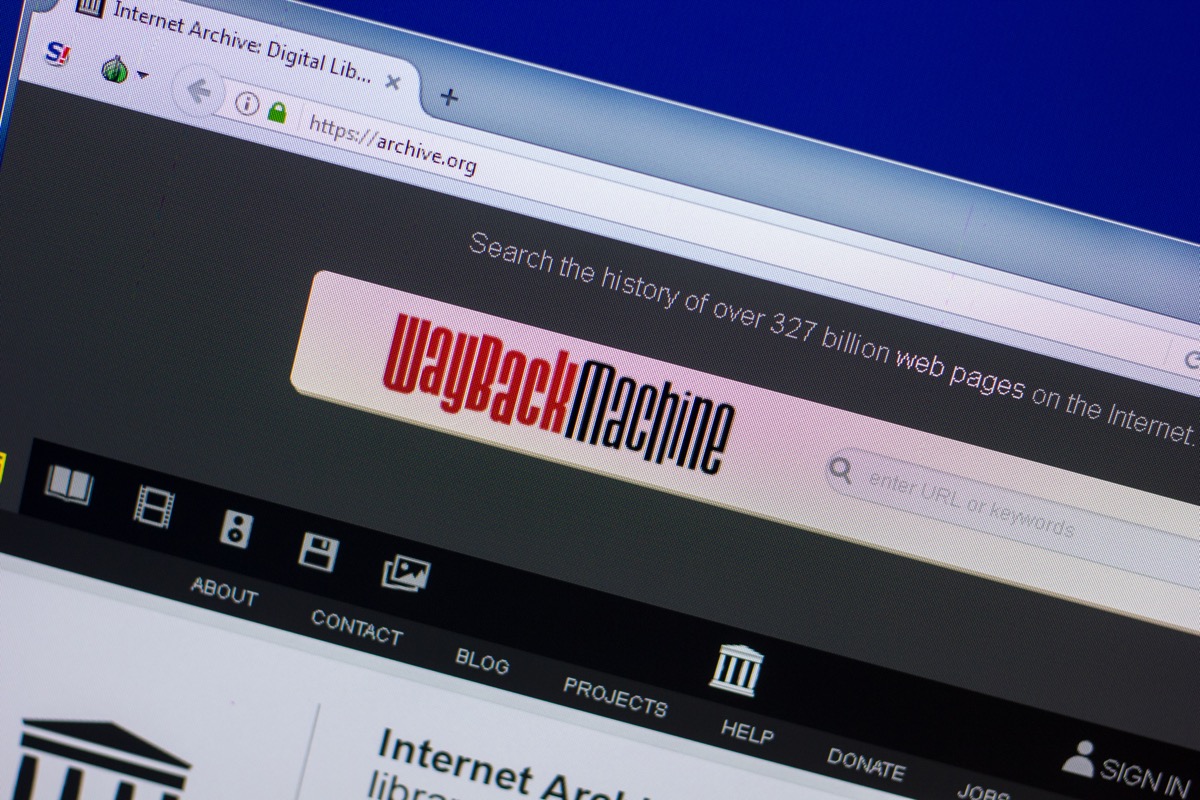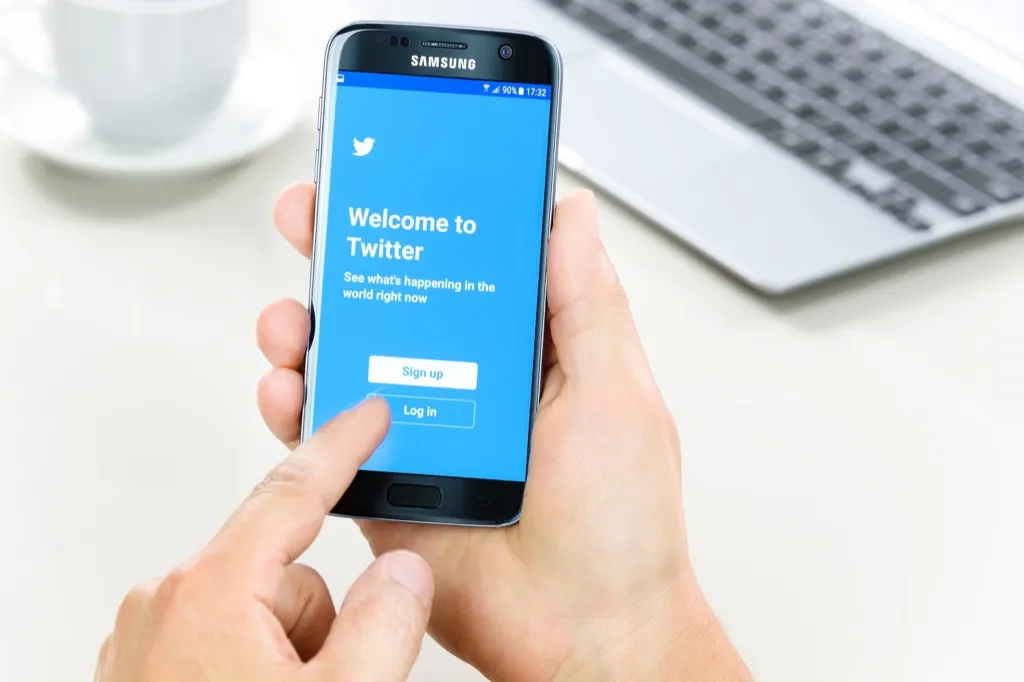35 Basic Facts About the Internet Everyone Should Know

Whether it’s for school, work, chatting with friends, dating, GPS navigation, leisure research, binge-watching Netflix, “Wikipedia holes,” finding and ranking restaurants on Yelp, or any other essential task, you use the Internet literally every single day. And yet, for those who aren’t tech gurus or Genius Bar staffers, our great global communications network may still remain something of a mystery.
Well, it’s high time to lift that shroud. From the surprising beginnings of the world wide web to the latest tricks hackers (and internet companies) are pulling on trusting users, here are 35 astonishing facts about history’s greatest technological innovation that every upstanding citizen should probably be aware of. And if you find yourself having trouble surfing the web, This Is Why Your Computer Is So Slow.
1
The Internet Is Actually a Bunch of Cables

While you think of the Internet as bits of data that effortlessly floats in the ether, it is much more complicated than that. Internet providers first had to lay hundreds of thousands of hair-thin cables around the world over decades of work. These cables run across continents, through our deep seas, and into our homes and workspaces. Sometimes, it takes a brave scuba diver to fix them when terrifying sea-faring creatures get late-night cravings. And for more science-backed, high-tech wisdom, these are The Best Computer Desktop Backgrounds for Maximizing Your Productivity.
2
The First Website Ever Went Up in 1991

Tim Berners-Lee had a stroke of genius in August of 1991. In honor of the World Wide Web Project, Berners-Lee put up the world’s first website, which educates users on how to create their own websites using the same process he did. It also explains hypertext (links to other sites or pages on the web, like these links here) and how to use it. You can check out its history or even visit the groundbreaking website itself, right at this link.
3
You Can Time Travel With the Wayback Machine

Well, sorta. The web is a mystical place that allows you to explore in ways that you can’t in the real world. Imagine you could pick a time and place and with the snap of your fingers, look at it frozen in time? Well, with the Internet Archive: Wayback Machine you can do that! This site lets viewers pick a place (er, web address) and a time that it was active to see what it looked like back then. Even if the site has deleted, you can still see cached pages from when it was active. And for more blasts from the past, recall the 20 Beloved TV Shows from the 1990s You’ve Totally Forgotten About.
4
The Internet Was Conceived Over 100 Years Ago

While it’s hard to actually pinpoint who invented the internet, we do know that scientists across the world were researching and studying it over one hundred years ago. Since electricity had been discovered, great thinkers like Nikola Tesla, Paul Otlet, and Vannevar Bush were able to deduce that we could harness the power of electrons to communicate with others wirelessly. Sadly, they lacked the technology to achieve the feat themselves, but it was their theorizing that lead to today’s technology. That’s right: You can thank Tesla, the world’s most notorious inventor, for the ability to watch cute puppies howling at fire engines.
5
Tesla Predicted Smartphones in The Early 1900s

Speaking of the history’s most notorious inventor, in 1926, Tesla is quoted giving a detailed prediction of what the smartphone has become to us today: “We shall be able to communicate with one another instantly, irrespective of distance. Not only this, but … we shall see and hear one another as perfectly as though we were face to face … the instruments through which we shall be able to do his will be amazingly simple compared with our present telephone. A man will be able to carry one in his vest pocket.” Too bad Tesla couldn’t use this knowledge to, well, invent the smartphone! And if you’d rather hark back to a phone-free time, here are 20 Genius Ways to Kill Time Without a Smartphone.
6
The First Webcam Was Created to Check on Coffee

In 1991, students at Cambridge University of England were sick and tired of getting up for a cup of coffee only to discover that the pot was empty. The solution? They set up a webcam that was hooked up to every desktop computer in the office. It would monitor the coffee pot by taking a picture every second (an early instance of 1 “frame per second,” or “fps”). It ironically predated the web, and was hooked up through cables.
7
You Aren’t as Incognito as You May Think You Are

Private browsing isn’t as private as you thought and a recent USA Today investigation proves it. Modes like this (Google Incognito is a popular one) wipe the sites you’re visiting as well as any saved information like usernames or passwords, but it only scrubs your own computer of it. Your history is still visible to your Internet Service Provider (ISP), so if you’re browsing on your work’s WiFi, they can still see the sites you’re spending your time on. Maybe close out of Facebook next time you clock in?
8
You Can Check If a Website’s Connection Is Secure

Ever had a computer crash because your grandma thought that she just had to download the “EVERYTHING IS FREE LIMITED TIME” coupon? Don’t worry, we know it wasn’t really Grammie, but your secret is safe with us. To browse safely, you can check which websites have a secure connection by looking to the left of the address bar or URL. If you see a padlock (🔒), the connection between the site and your PC is safe. Click on it to see what cookies (data-caching code, which we’ll explain momentarily) the site is using, too. Still, you should always avoid sharing any personal information over the web.
9
Website Cookies Leave a Crumb Trail to your IP Address

Ever wonder what those things called cookies are? They’re not virtual baked goods, but instead are a way that websites can monitor website usage on your computer. It helps websites decide what ads to display, or helps remember your username for an easier log-in next visit. Even though cookies tell websites certain things about your browsing habits, they don’t actually track it back to your personal name. They track it to your IP address, which is like your computer’s birth name. Only in severe legal cases or if you’re using a work computer, can this be tracked back to you.
10
Fortnite Is the Most-Searched Term in the Country (Right Now)

Maybe you live with a teenager, you teach kids, or have attended a professional sports game where someone was doing the “Orange Justice” on the megatron. If so, the video game Fortnite has likely been burned into your brain much like it has been burned into Google’s search engines: For the past year, it’s been the top searched term in the States. If you are curious about what Americans are curious about, you can see using the Google Trends tool. Don’t believe us? Check out the most current Search Trends of the past 12 months for yourself!
11
The Top Visited Websites Are…

The world likes to use the internet for three reasons: to satisfy their hungry minds, to watch videos, and to be virtually social with others. Unsurprisingly, they do this through Google, Youtube, Facebook, Wikipedia, and a site you may not have heard of named Baidu. Baidu is China’s popular search engine, and runs very similarly to Google. (Since 2014, Google has been inaccessible in China.) If you are wondering where else internet users around the world like to spend or shamelessly waste their time, check out the top 500 visited websites globally, according to definitive internet analytics company Alexa.
12
Most Americans Shop Online

Interested in online shopping statistics? Well, one popular figure states that 79 percent of American consumers shop online. Back in 2000, though, that statistic was a mere 22 percent and since then has skyrocketed to where it is today. This is likely due to popular websites like Amazon, Ebay, and popular department stores like Target that have capitalized on our capitalism in America, netting approximately $504 million in revenue this year. (That number is only expected to rise in the future.) You could buy 413 million people a bottle of water with that money! And to find out how to cut back on your digital shopping, learn about the 40 Things You Should Never Buy Online.
13
Hackers Like to Go “Phishing” for Scams

Phishing is a type of hacking where individuals create fake emails from big companies to try to get internet users to share personal information. The best way to avoid getting scammed is to recognize when an email is a phishing attempt (if the headline or subject matter is “too good to be true”, exciting, or unrealistic). Don’t send personal information through emails, including filling out any forms that ask you to input personal information like credit card numbers, social security numbers, logins or passwords. If you don’t bite their bait, they can’t catch their “phish!” And to ensure your safety from all kinds of phishing, brush up on the 40 Scams People Over 40 Should Stop Falling For.
14
Pizza is the Most Digitally Photographed Food

Photos of pizza slice their way to the top of the charts on Instagram. (Sorry, that was cheesy.) Really, though, the most common food that people showcase on their IG profiles is pizza. According to a Telegraph report, that’s followed by sushi, coming in at second place. After that comes juicy steak, burgers, and bacon as the most popular food art on the web.
15
T-Mobile Has The Fastest Internet Around

Many ISPs boast their impeccably fast performances on the net. But T-Mobile’s slogan, “The best carrier in wireless just got better,” is true to its word. It is currently researching and implementing technology that would allow users to access 5G wireless. With this newly constructed cellular network, users could experience speeds of up to 600 megabits per second (mbps). Bandwidth is measured in mbps and is the amount of data that can travel over the internet to your computer. Speeds of 600mbps would mean you’ll soon be able to download an entire HD movie in 7 seconds. Not to sound like a shill, but maybe it’s time to reconsider your wireless contract?
16
You Can Stargaze Indoors

People have been complaining for years that the internet draws us to our screens instead of drawing us to the beautiful outdoors. Well, sure, now, more than ever, that may be true. But, I mean come on, who can turn down gazing at the endless night sky? Using Google’s Sky tool, users can lose themselves in galaxies far, far away. You can also explore the Moon and Google’s interactive map of past exploration. You can even visit Mars with and see the astronomically beautiful planet (that NASA just landed a vehicle on for the eighth time in history, by the way). So grab your blankets and laptop chargers, folks!
17
Thousands Websites Are Hacked Every Day

With great power comes great responsibility—and great temptation to use skills for evil. Peter Parker won’t be able to save you this time. Forbes reports that 30,000 websites are hacked everyday. It is no surprise, considering the advancements in technology, which has allowed users the ability to download tools of destruction at the click of a button. Guides and manuals are available, so even the average Joe can gain the ability to take down major sites. Make sure you protect yourself online.
18
Yahoo! Had the Biggest Data Breach in History

Speaking of hacking, Internet giant Yahoo! is known currently for having the largest data breach in internet history. In September 2016, Yahoo! was the unfortunate target of this breach while in the midst of a huge sale to Verizon. This attack left 3 billion Yahoo! users vulnerable. Passwords and usernames were unencrypted along with security questions and answers. As a result, Yahoo! lost approximately $350 million in its sale price to Verizon.
19
There Are Different Levels Of Privacy On The Net- Use a VPN for more

No matter how many times you delete your browser history and clear your cookies, your computer still leaves a trace on the web. Websites can see that your computer has accessed their sites through your Internet Protocol (IP) address. It isn’t your name, but still leaves a trace back to you. The solution to this? Virtual Private Networks (VPNs). You can use a VPN that has a foolproof way to encrypt (or scramble up) your data.
20
You Can Mute Tabs In Chromes

Ever trying to focus on something, but some nagging ping keeps coming from nowhere in particular? Or maybe you’re at work when the sound of Jamie Curtis’ Activia ad bursts through the awkward silence? Well, now, in Google Chrome browsers, you can silence the tabs without having to close them out. Simply look up where the tabs are and seek out any tab that has a volume symbol. This is the tab that is making all that pesky noise, so right-click and choose “mute site” from the drop down menu. Viola! You can now work in a silent peace.
21
Cybercrime Will Net Profits Over $1.5 Trillion In 2018

Scammers online make $1.5 trillion per year as a whole by preying on companies and users all over the web. By scamming vulnerable users all over the world, these insidious hackers make enough money collectively to match what France spends on its entire country in 1 year. Scammers use the internet to do things like impersonate companies to steal personal information from consumers, “phish” with coercive emails, or find ways to hide profits in the expanse of the World Wide Web. Be safe and make sure the personal information you share is limited to only trusted, reputable websites.
22
Twitter Started Out of a Failed Business Venture

Many people don’t know how Twitter was founded, a “Plan B” to Noah Glass’ venture into the podcasting arena, which was out-dominated by iTunes. Evan Williams, an ex-Google staffer, invested in a startup called Odeo. Noah Glass had been the founder, but everyone involved in the startup decided to cut their losses when Apple had dominated the podcasting industry. It was then that Jack Dorsey came up with an idea, called Twttr, where everyone could share their “statuses” of their days live. While Glass, Dorsey, and a man named Florian Weber don’t get the founding credit, they were the men who were behind the project that eventually became Twitter.
23
There Are 2 Billion-Plus Facebook Users

There was a time when you could post on Facebook and not worry if your twice-removed, great aunt Mildred would comment from her Chihuahua’s profile. Facebook went from the brainchild of college students who wanted a better way to socialize with classmates to the top social media platform in the internet’s history. Today, there are 2.27 billion active users on its site, which accounts for approximately 35 percent of the total world population (out of the 53 percent of the population that is even active on the internet).
24
Only A Quarter Of Global Internet Users Have Complete Freedom

Shocking statistics gathered by research organization FreedomNet showed that only 23 percent of users were allowed non-restricted, reign of the web in 2017. Of the countries that were tested, 36 percent had no freedom and 28 percent were partly free to surf the web (13 percent were not able to be tested). Research about free countries, like the United States, still noted that while users may be free, they were still limited in other ways. For instance: journalists who receive death threats after posting news articles, and then grow quiet as a result.
25
Thousands of Companies are Spying on You

In 2018, Facebook was criticized collecting data from its users profiles. Beyond knowing our likes, dislikes, or what ice cream flavor we are, it also buys data from other companies in order to profit off of the ads it tailors to us. This is one high-profile case of the thousands of companies that also spy.
26
This Keyboard Shortcut Will Ease Your Mind

Have you ever spent valuable time reading your way through a thorough and lengthy article, only to accidentally close out of it? No worries, just press Ctrl + SHIFT + T and you will get it back. This trick works in most internet browsers and can not only save you time, but also might save your computer from the ensuing rage of losing those precious minutes of research.
27
We Will Never Run Out of IP Addresses

An IP address may look something like this: 172.233.xxx.xxx. We will never run out of them as there are 100 IP addresses for every single atom on earth! The mathematical breakdown implies that our planet would have to go extinct—as in, sun death—before we ran out of these unique identifiers. You can check yours out by typing “what is my IP address” into Google’s search bar.
28
You Might Qualify for Free Internet!

Free internet! Read all about it: Get your free internet here! You heard it right. Certain organizations, companies and nonprofits have made it their mission to help people connect. President Barack Obama also backed The Lifeline Program proposed by the Federal Communications Commission that brings phone and internet services to low-income families across the nation. Nonprofits like www.EveryoneOn.org help users search their area for free public WiFi, but also work with users to determine if they are eligible to receive discounted or free internet service.
29
The First Photo Ever Uploaded Was of a Comedy Band

Tim Berners-Lee, the same man who launched the net’s first website in August 1991, decided that he would test out the ability to upload photos. He was working in Switzerland at the time, so he decided that a backstage shot of the band that an IT developer had seen recently would be appropriate. It was like an ancient Instagram from technology geniuses!
30
Your Wifi Could Probably Be Faster

We’ve all been there. It’s a beautiful Sunday night and you’re watching The Haunting of Hill House. Right before a big-reveal (no spoilers, we promise), the TV displays the biggest horror of all: the dreaded buffering screen. Well, fear not! There is a solution: Simple things like changing your router location, installing cheap WiFi range extenders, or disconnecting idle devices (smartphones that may be hooked up to the WiFi but asleep) can get you back to your binge in no time.
31
Your Wifi Could Probably Be Safer

Just like you can take those simple steps for faster WiFi, you should also be taking measures to ensure that your WiFi is safer too. These following steps may give you some peace of mind: establishing that your password is encrypted using WiFi Protected Access (WPA), WPA2, or WPA3. Also, change that password from the default one that your Internet Service Provider gave you. Using firewalls help and even going as far as creating a separate guest account may help. This way, you know your neighbor’s tech-savvy kid isn’t freeloading when they’re grounded from their own internet access.
32
Use An Asterisk* Symbol To Help You Remember Forgotten Lyrics

You’re waiting in line for coffee and it hits you—the biggest blank in lyrical history: “Just a small town girl, livin’ in a ….. world” Shucks!! What is it? “Livin’ in the … only world?” No. That’s not it. Well, you can ensure that you never end up stuck in Journey (or any other band) purgatory again. Open up a Google search, and put an asterisk in place of the word you’re blanking on. This search method works for any term in a phrase you can’t complete and also helps to make your generated results much more accurate.
33
You No Longer Have to Answer Calls from Older Relatives Asking for Tech Advice

While it is a stereotype that older folks aren’t the savviest of techies, this is helpful for anyone out there who constantly finds themselves saving friends and family from a world of tech frustration. There are many services online, like Tom’s Hardware Forum, that offer free and helpful advice on a wide, diverse range of common tech issues—most of which can, frankly, be solved with the “turn it off and back on again” cure-all.
34
One of the Nascent Sites Was an Evite Service

The e-card website www.AmericanGreetings.com topped the charts for websites with the most traffic in 2001. It was 12th on the list among giants like AOL and Yahoo!, before Google had obliterated the internet’s charts. In today’s world, you may never see smaller companies like this captivate the minds of our connected world, but in 2001 it was all the rage. Other ancient chart-topping greats include Ask Jeeves, Walmart, and Ebay. And for more digital relics, check out these 20 Once-Useful Technologies You Never See Anymore.
35
Press F12 to Edit or Change Any Website’s HTML or CSS Code

Try it out right now: Press F12 and the developer mode should pop up. With this you can do some cool things like change the website’s font color, font style, the title of each page, or delete text. Any edits are only temporary and only affect what you see in your own browser, so don’t get too excited, MacGyver.
To discover more amazing secrets about living your best life, click here to follow us on Instagram!